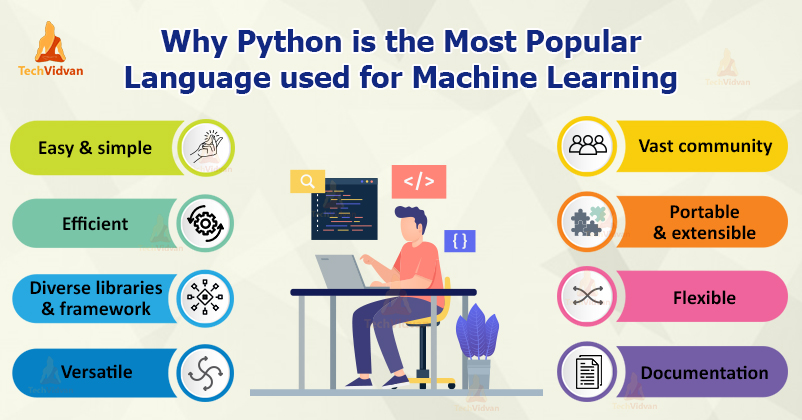Why Python is the Most Popular Language for Machine Learning?
Machine Learning is a new backbone of the IT industry. It empowers a computer to achieve any task without programming it openly. This evolving technology practices computer algorithms.
The purpose of doing this is to analyze data and make intelligent decisions based on past understandings.
ML algorithms are skills with a bulky set of data that they acquire from samples. There are several cases, say Google Search Engine, Facebook, LinkedIn implant Machine Learning algorithms in their structure.
Python is a widely-used programming language for investigation drives.
Though Python for machine learning is an open-source programming language, it is also a cooperative language, which has crystal clear syntax.
Python for Machine Learning
Now, let’s understand why Python is so popular and consequently best suited for Machine Learning:
1. Python is easy and simple
The most important feature of Python for machine learning is that it does not need any hardcore programmer to put effort into it.
Many pieces of research verify that the semantics of Python have correspondence to numerous mathematical ideas. As a result, it does not take much to learn to apply those mathematical ideas in this informal language. It is humble with an effortlessly comprehensible syntax.
The straightforwardness of Python lets the developer focus on actually solving the ML complications, rather than setting the bugs.
2. Python is efficient
Python for machine learning is supremely efficient. The code of Python is comfortably sensible by individuals. It performs the bulky task using fewer line of code, doing this one can save the memory space.
3. Python has diverse libraries and framework
Python for machine learning is an abundant source of libraries and frameworks. It comes with plenty of integral libraries. It comprises of some special tools that are extremely useful while working with the Machine learning system.
These libraries are Keras (which particularly throw light on experimentation with deep neural networks), TensorFlow (which is applicable for many Machine Learning applications), etc. as the list keeps going and never ends.
4. Python is versatile
Though Python has crossed more than two decades, it is still flattering extra versatile over time. Considering today’s situation, one can implement Python on almost all software, actions, infrastructure, etc.
Incredible data handling tool is also served by Python, making Python can deal with a huge amount of data.
5. Python has a vast community
Since Python’s release, the community is largely supporting Python learners. They help learners improve their Machine Learning knowledge and never fell abandoned to cope-up with sudden changes.
6. Python is portable and extensible
Python programs can work on any other platforms without making any significant changes.
Many developers prefer Graphics Processing Units (GPU) to train their ML models on their machines, hence giving this feature height in the sky.
Python can be extended to supplementary languages, i.e., one can write Python code in any other languages as well.
Consider for Ex, you require a piece of code to run very fast, so you can code that piece of your program on C, C++ and further use them for your Python program.
7. Python is flexible
Python Developers have the right to choose between OOPs and scripting. Developers can choose the programming style they are used to, else they can combine these styles to crack different snags in a well-organized manner.
Hence making Python a great choice for Machine Learning.
8. Documentation
Lastly, Python has an attractive feature of documentation and lessons. The community of Python provides support and help through tutorials and discussion forums, leading an easy and efficient way to code.
Conclusion
Finally, we saw the importance of Python for Machine Learning.
Machine Learning is a fast-growing technology that is serving scientists to resolve real-life dilemmas and coming up with ingenious resolutions. And many features are proposed by Python that is cooperative for Machine Learning in particular.

